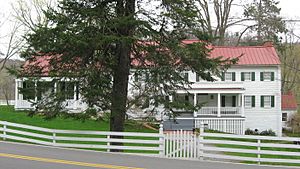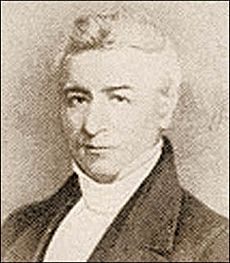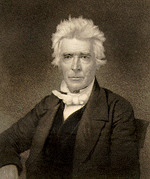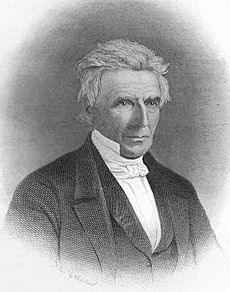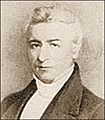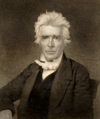Alexander Campbell (minister) facts for kids
Quick facts for kids
Alexander Campbell
|
|
|---|---|
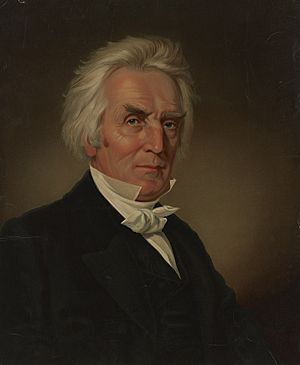
Campbell around 1855
|
|
| Born | 12 September 1788 Broughshane, County Antrim, Ireland
|
| Died | 4 March 1866 (aged 77) Bethany, West Virginia, U.S.
|
| Occupation | Minister |
| Known for | Leadership in the Restoration Movement |
| Spouse(s) |
Margaret Brown
(m. 1811; died 1827)Selina Huntington Bakewell
(m. 1828) |
| Children | 14 |
| Parent(s) |
|
Alexander Campbell (born September 12, 1788 – died March 4, 1866) was an important religious leader. He was born in Ireland and later moved to the United States. There, he became a minister and, along with his father, Thomas Campbell, helped lead a movement called the Restoration Movement.
This movement aimed to bring Christian churches back to what they believed were the original teachings and practices found in the New Testament. They wanted churches to be non-denominational, meaning they wouldn't belong to a specific branch of Christianity.
In 1832, Campbell's group joined with another similar movement led by Barton W. Stone. Their churches became known as Disciples of Christ or Christian churches. Today, several church groups, like the Churches of Christ and the Christian Church (Disciples of Christ), have historical ties to Campbell's work. He also founded Bethany College in West Virginia.
Contents
Early Life and Education
Alexander Campbell was born on September 12, 1788, in County Antrim, Ireland. His parents, Thomas and Jane Campbell, were of Scottish background. Like his father, Alexander studied at the University of Glasgow in Scotland. There, he was influenced by important ideas from the Scottish Enlightenment, which focused on reason and new ways of thinking. He was also influenced by the English philosopher John Locke.
In 1809, when he was 21, Alexander moved to the United States with his mother and siblings. They joined his father, Thomas, who had moved there earlier. They sailed from Scotland and arrived in New York City, then traveled to western Pennsylvania. Alexander was ordained (officially made a minister) by his father's church on January 1, 1812.
Family Life
A year before becoming a minister, Alexander Campbell married Margaret Brown on March 12, 1811. Margaret's father owned a lot of land near Bethany, Virginia (now West Virginia). Alexander and Margaret lived in what is now called the Alexander Campbell Mansion and had eight children.
When their first child was born in 1812, Campbell began to study baptism. He concluded that the Bible did not support the baptism of babies. He came to believe that people should choose to be baptized only after they had decided to follow Christian teachings themselves.
After Margaret passed away in 1827, Campbell married Selina Huntington Bakewell on July 31, 1828. They had six more children together.
Public Service and College Founding
From 1815 to 1834, Campbell and his father's church were connected with a local Baptist group. However, they later had disagreements and joined another Baptist association.
Campbell also served in politics once. He was a delegate (a representative) at the Virginia Constitutional Convention of 1829–1830 in Richmond. During this time, he met many important politicians and was asked to preach in several churches.
In 1840, Campbell founded Bethany College in Bethany, Virginia (now West Virginia). He believed that ministers should have a college education. Many future leaders of the Disciples of Christ and Churches of Christ graduated from this college.
Travels and Debates
In 1847, Campbell visited the United Kingdom. He gave public talks in England and Scotland. He also went to Ireland to deliver money that churches in the U.S. had collected to help people during the Great Famine.
While in Glasgow, Scotland, he had a public debate with James Robertson about slavery. This debate became very heated. As a result, Robertson sued Campbell for libel (writing or saying something false that harms someone's reputation). Campbell denied the charge and was arrested. He was held for ten days until his arrest warrant was found to be illegal. The case eventually went to court, and the jury decided in Campbell's favor.
Later Life and Legacy
Alexander Campbell passed away on March 4, 1866, in Bethany, West Virginia. His wife, Selina, died many years later in 1897. His nephew, Archibald Campbell, became an important leader who helped create the state of West Virginia.
Writings and Publications
When he was in his early 20s, Campbell wrote several essays under the name "Clarinda." In 1820, he had a debate with a Presbyterian minister named John Walker, which reminded him how powerful writing and publishing could be. In 1823, he bought a printing press and started a successful publishing business.
Campbell edited and published two important journals. The first was Christian Baptist, which he edited from 1823 to 1830. The second was The Millennial Harbinger, which he started in 1830 and continued to edit until he died in 1866. In both journals, he promoted his ideas for reforming Christianity. He also encouraged other writers to share their different ideas, which led to many discussions within the movement.
Campbell changed his journal from Christian Baptist to Millennial Harbinger for several reasons. There were growing differences between his followers and the Baptists. He also wanted the new journal to have a more hopeful tone, focusing on preparing the world for a better future and the return of Christ.
Campbell also wrote several books, including The Christian System. He wrote hymns too, like "Upon the Banks of Jordan Stood." He also put together and published his own translation of the New Testament, called The Living Oracles, in 1826.
Key Works
- The Living Oracles (1826) – Campbell's translation of the New Testament
- Psalms, Hymns and Spiritual Songs (1828)
- Prospectus of the Millennial Harbinger (1829)
- Delusions: An Analysis of the Book of Mormon (1832)
- The Christian Preacher's Companion (1836)
- The Christian System (1839) – a summary of Campbell's religious ideas
- The Christian Hymnbook (1843)
- A Tract for the People of Kentucky (1849)
- Christian Baptism—Its Antecedents and Consequents (1851)
- The Acts of the Apostles (1858) – Campbell's translation of this Bible book
- Memoirs of Elder Thomas Campbell (1861)
- Popular Lectures and Addresses (1863)
- Familiar Lectures on the Pentateuch (1867)
Public Debates
Alexander Campbell often took part in public debates. These were formal discussions where he would argue his religious views against others. His debates often gained national attention when their transcripts were published.
Some of his notable debates included:
- In 1820, he debated Rev. John Walker about baptism.
- In 1823, he debated Rev. William L. McCalla, a Presbyterian minister, about infant baptism.
- In 1829, he debated Robert Owen about socialism and Christianity.
- In 1837, he debated Archbishop John Baptist Purcell about Protestantism and Roman Catholicism.
- In 1843, he defended the Restoration Movement in a debate with Rev. Nathan L. Rice, who represented traditional Presbyterianism.
Legacy and Honors
- Campbell played a key role in the Restoration Movement. This movement led to new directions for Christians in America and the founding of many new, non-denominational churches.
- His home in Bethany, West Virginia, the Alexander Campbell Mansion, is recognized as a National Historic Landmark.
- The Alexander Campbell Auditorium at Culver-Stockton College is named in his honor.
- Campbell is known to have preached at the Slash Church in Virginia, which is now on the National Register of Historic Places.
See Also
- José María Jesús Carbajal, spiritually mentored by Campbell
- Old Bethany Church
Images for kids
 | Shirley Ann Jackson |
 | Garett Morgan |
 | J. Ernest Wilkins Jr. |
 | Elijah McCoy |


